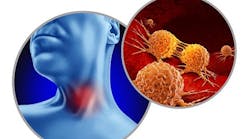While I was explaining the importance of tongue care, the patient spoke up and said, “No one has ever talked to me about my tongue!”
As dental professionals, are we forgetting to examine the tongue? How often do you ask your patients about it? This discussion can begin during the oral cancer screening and continue from there if needed. How does your tongue feel? Is it ever coated? Have you noticed lumps, bumps, or changes? Are you cleaning your tongue? If so, how? If not, why?
You may also be interested in ...
Diseases most likely to affect the tongue and the importance of proper examination and diagnosis
On the tip of my tongue: Differential diagnoses for tongue lesions
What’s the big deal about the tongue? Respiratory, autoimmune, and inflammatory issues often manifest in the oral cavity, especially on the tongue. Tongue conditions may indicate an imbalanced mental, digestive, or systemic load. Plus, the tongue is like a large petri dish—a perfect surface for bacteria, fungi, or viruses to grow. The oral cavity, with the tongue front and center, is a direct pathway to the bloodstream and the respiratory and digestive systems. This makes tongue care an essential way to improve oral health by preventing pathogens from entering other bodily systems.
Because the tongue is often in the way during appointments, we can’t ignore it. The next time you look at a patient’s tongue, ask: What is it trying to tell me? We can use these treatments and therapies to help educate patients on the importance of tongue care.
Tongue care recommendations
Many of our patients don’t regularly clean their tongues. One of the biggest reasons seems to be that tongue cleaning triggers a gag reflex. But finding the right tool for these patients will be worth it as they see benefits such as improved breath and oral-systemic health, fewer pathogens, and a better ability to taste. Educating patients on these benefits and options for tongue care can help motivate them to improve their home care routine.
Some options for tongue cleaning include a stiff toothbrush used only on the tongue, a tongue scraper, or even a piece of floss held in each hand and gently drawn from the back of the tongue to the front. Ideally, patients will clean their tongue twice a day, and more often for special conditions. A clean tongue should be free from food, plaque, and coating. For visual learners, it can be helpful to offer educational pamphlets or direct them to online videos about tongue care.
Halitosis is probably one of patients’ most common oral complaints. This can be minimized by simply cleaning the tongue and using a mouthrinse. These rinses can be beneficial as they neutralize volatile sulfur compounds produced by debris left on the tongue. Some mouthrinses can irritate the oral cavity, especially the tongue. A pH-neutralizing mouthrinse is preferred because it doesn’t burn or irritate the oral tissues. It can also balance oral pH and increase overall oral health by protecting against decay and periodontal disease.
Four conditions that may warrant special attention
Some conditions may require extra attention beyond routine tongue cleaning. Patients may need additional treatments and therapies outside of daily tongue care.
Lichen planus is a chronic condition that gives the tongue a lacy appearance. It occurs when the immune system overreacts and attacks the oral mucosa. There is no cure; however, lichen planus is often managed without medications by lowering the inflammatory load, boosting the immune system, encouraging good oral hygiene, and avoiding triggers that set off the immune system’s attack.1 Making the patient aware of triggers such as allergies, stress, and possibly drugs can help them lessen the severity and duration of lichen planus episodes.1
In more severe cases, treatment may require corticosteroids to reduce inflammation or immune-suppressing medications.1 Treatment may be administered in rinse, pill, or injectable forms.1 Pain-relieving medications are also recommended when warranted.1
In the case of atrophic glossitis, the tongue is enlarged and has a smooth appearance. Causes include injury; infection from bacteria, viruses, and fungi; systemic and autoimmune diseases; and vitamin deficiencies.2 Symptoms may vary from person to person due to the origin of the underlying conditions.2 A variety of treatments is available, ranging from antibiotics, antifungals, antivirals, immunosuppressive medications, dietary counseling, and nutritional supplements such as iron and vitamin B12.2 Identifying the cause of the problem is critical to determining the treatment needed.
Thrush, or oral candidiasis, has a cottage cheese-like appearance. This condition involves a yeast or fungal infection that can be attributed to certain medications such as antibiotics or systemic inflammatory conditions such as diabetes.3 Xerostomia from mouth breathing, side effects from medications, and autoimmune conditions can also play a role in the overgrowth of Candida albicans.3 Typically, topical antifungal medications in lozenge or rinse form are the treatment of choice.3 In more severe cases, oral medications may be needed.3 Advise patients to replace their toothbrush and other oral care products that may have been contaminated.3 Be sure to treat any oral appliances with the same medication so the appliance won’t reinfect the patient.
Geographic tongue is a common tongue condition that is nonthreatening, inflammatory, and possibly genetically related.4 It has been linked with asthma, allergies, skin conditions, systemic diseases, hormonal changes, vitamin deficiencies, and stress.4 It also has links to Reiter’s syndrome and Down syndrome.4 Similar to lichen planus, inflammatory triggers will often stimulate the tongue condition to flare. It is important to figure out the patient’s triggers so they can be avoided. In most cases, geographic tongue doesn’t require medical treatment, but some patients may need mild pain relievers or an antiseptic antihistamine to suppress the immune response. Decreasing stress, boosting the immune system, lowering systemic inflammation, and taking needed vitamins and minerals are often helpful therapies.4
Natural wellness considerations
While pharmaceuticals can be helpful, look at a broader picture and consider natural alternatives to restoring tongue health and overall wellness. Encourage patients to be mindful of proper nutrition and hydration, thus rebuilding gut health. Explain that 70%–80% of the immune cells in the gut actively affect systemic health.5
Sugar is a major source of inflammation, so minimizing processed and added sugars could improve tongue health. Michelle Jorgensen, DDS, a biologic and holistic dentist, believes that geographic tongue is largely a fungal condition that can be prevented by tongue scraping and avoiding sugar.6 She teaches her patients that the tongue is like a shag carpet collecting plaque, mucus, and yeast, which should be removed with proper daily cleaning.6
Natural remedies have been used for centuries and still have a place in dentistry today. Some medicinal plants that can improve oral health are aloe vera, alfalfa, and red clover.7 As more people become resistant to common pharmaceutical medications, researchers are looking for new options.8 Studies report that both green tea and chamomile tea could have bactericidal effects, decreasing the oral bacterial load.9 Green tea specifically has been shown to improve oral health due to its antiviral, antibacterial, anti-inflammatory, and antioxidant properties.10
Tongue health is important! We can share universal tongue care techniques, pharmaceutical treatments, and natural remedies with our patients. While these methods work for most individuals, some tongue conditions may be telling a more serious systemic story. In these cases, a biopsy or referral to the appropriate health-care specialist may be warranted.
Editor's note: This article appeared in the May 2023 print edition of RDH magazine. Dental hygienists in North America are eligible for a complimentary print subscription. Sign up here.
References
- Oral lichen planus. Mayo Clinic. Updated December 6, 2019. Accessed February 18, 2023. https://www.mayoclinic.org/diseases-conditions/oral-lichen-planus/symptoms-causes/syc-20350869
- What to know about glossitis. Medical News Today. Updated March 23, 2022. Accessed February 18, 2023. https://www.medicalnewstoday.com/articles/322135
- Thrush. Cleveland Clinic. Reviewed January 5, 2023. Accessed February 18, 2023. https://my.clevelandclinic.org/health/diseases/10956-thrush
- Penning C, Gurenlian JR, Bono L. Treatment strategies for geographic tongue. Decis Dent. August 16, 2021. Accessed February 18, 2023. https://decisionsindentistry.com/article/treatment-strategies-geographic-tongue/
- Wiertsema SP, van Bergenhenegouwen J, Garssen J, Knippels LMJ. The interplay between the gut microbiome and the immune system in the context of infectious diseases throughout life and the role of nutrition in optimizing treatment strategies. Nutrients. 2021;13(3):886. doi:10.3390/nu13030886
- Jorgensen MC. Healthy Mouth, Healthy YOU! Holistic Dental Guide. Independently published; 2019.
- Abuzenada BM, Pullishery F, Elnawawy MSA, et al. Complementary and alternative medicines in oral health care: an integrative review. J Pharm Bioallied Sci. 2021;13(Suppl 2):S892-S897. doi:10.4103/jpbs.jpbs_92_21
- Zhao XA, Mannen JK, Nguyen G. Improving oral health one tea at a time. Dimens Dent Hyg. October 27, 2021. Accessed February 18, 2023. https://dimensionsofdentalhygiene.com/article/improving-oral-health-one-tea-time/
- Ahmed MAA, Pavani B, Tanzila TL, et al. Effects of green tea and chamomile tea on plaque pH, salivary pH, Streptococcus mutans count. Indian J Pharm Biological Res. 2017;5(4). doi:10.30750/ijpbr.5.4.1
- Vyas T, Nagi R, Bhatia A, Bains SK. Therapeutic effects of green tea as an antioxidant on oral health – a review. J Family Med Prim Care. 2021;10(11):3998-4001. doi:10.4103/jfmpc.jfmpc_943_21






